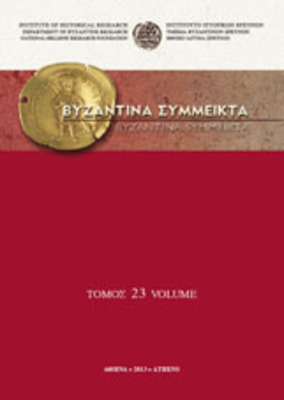The Terms Ῥωμαῖος, Ἕλλην, Γραικὸς in the Byzantine Texts of the first Half of the 13th Century
Part of : Βυζαντινά Σύμμεικτα ; Vol.24, No.1, 2014, pages 157-176
Issue:
Pages:
157-176
Section Title:
Historical Inquiry, Literary analysis
Author:
Abstract:
The term collective identity denotes a theoreticalpattern of interpretation of social groups. More specifically, it denotes the awareness of the members of a group that they are linked together in a complex environment of common beliefs and values. During the Nicaean period, a distinct collective identity can be discerned, as it emerges from the scholarly literature. This identity is delineated by the namesRomaios, Hellene, and Graikos (names already attested in the previous periods), which bear specific values. The name Romaios signifies political values. The name Hellene refers to the Greek language, education, and culture, whereas the name Graikos denotes the Greek-speaking Christians. All three terms present semantic diversity depending on their context, particularly the term Hellene. Nevertheless, they compose a unified set withdistinctbutstrongcomponents, eachimplyinganddefiningoneanother, without, however, alteringtheirseparateconnotations. These aretheelementswhichconstitutethecollective identityofthe Nicaean scholar and nobleman.
Subject:
Subject (LC):
Keywords:
Romaios, Hellene, Graikos, Collective identity, Nicaea, 1204-1261
Electronic Resources:




